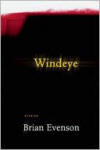Windeye
Brian Evenson’s latest collection toes the line between genre and so-called literary fiction and between a recognizable world and new dimensions. Those familiar with his previous work won’t be surprised, as Evenson frequently does this; however, this certainly isn’t a run-of-the-mill collection.
Brian Evenson’s latest collection toes the line between genre and so-called literary fiction and between a recognizable world and new dimensions. Those familiar with his previous work won’t be surprised, as Evenson frequently does this; however, this certainly isn’t a run-of-the-mill collection.
Windeye plants the individual into new, disorienting worlds. The protagonists in these stories often deal with loss, frequently the loss of a sibling. The inescapable feeling that perhaps the loss is mistaken, and that maybe the missing sibling never really existed, magnifies the sense of disorientation. Stories such as “The Dismal Mirror” and the title story place protagonists in just such a situation. Loss of identity and a recognizable home are also prevalent themes throughout. “Discrepancy” explores a much more mundane form of terror as the protagonist experiences an unexplainable delay in hearing that seems somehow connected with the settling of her passion for her husband.
The reader often shares the bewilderment of these trying situations in stories such as “Angel of Death” and “The Second Boy.” In the former, an unidentified man walks with seven strangers through a watery world obscured by fog. The narrator writes about each day’s activities in a journal although all the men do is walk, with one occasionally collapsing and dying. The narrator then catalogues the dead man’s name, and soon, this power becomes the focal point for the rest who are compelled to keep on walking. In the latter story, the reader isn’t sure who is whom, where the often obtuse characters find themselves, or where they are headed (and for what purpose) in a dense, snowy world. It seems as if these characters can do nothing except try to find meaning in empty places. Stories fill the void, and often, they fill in the gaps left unexplained by the mysteries of real life, even if nothing is resolved in the end. “But sometimes, thought Leppin, it is enough for things just to be over, even if they end badly. Sometimes that was all you could hope for.”
“The Dismal Mirror” is filled with gothic details and is set mainly in a creaky, old house. Allusions to caves and the terror of having the missing return in the dead of night connect this and the other tales of lost loved ones to the penultimate story, “Grottor,” in which perhaps the answers to the questions of how and why are provided. “The Moldau Case” is a nod to the old deductive mysteries of Poe and Doyle, although with more of a narrative concern with the psychological motivations of revenge rather than solving a mystery. The terror of “The Sladen Suit” is classic gruesome-detail oriented horror. The reader squirms along with each character that attempts to wear the wetsuit, and it’s details like these throughout the book that will give genre fans a thrill.
Common to many of these stories is the urge for protagonists to write their experiences down for posterity. Perhaps the only way to find satisfying answers or peace of mind in perplexing and trying situations is through the ways they define them as such. “Hurlock’s Law” explores the mystery of meaning explicitly as the protagonist, Hurlock, encounters strange words and phrases. He devises a list of propositions for how one might decode syntax and semantics from the words that can direct the path of one’s continued (or abruptly discontinued) existence. “Knowledge” takes this theme to its literal and logical end. This is a four-page story that reads like a craft lesson in why and how the locked-room dilemma just doesn’t work anymore, in fiction or in real life.
Comparisons with writers such as Poe, Kafka, and even Stephen King are justified; the writer who can effortlessly blend genre and literary elements into a cohesive, dynamic collection is someone who earns my respect and interest, and Evenson is definitely one of those writers. Windeye is first and foremost a ghastly fun read, but it also has heart. For anyone who has lost or has even pondered the loss of a loved one, certainly the sense of longing will be undeniable. This book is proof of a master working at his best.





